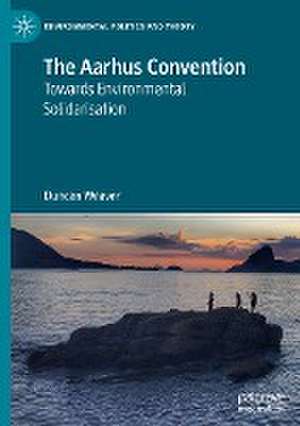The Aarhus Convention: Towards Environmental Solidarisation: Environmental Politics and Theory
Autor Duncan Weaveren Limba Engleză Hardback – 31 oct 2023
Preț: 696.50 lei
Preț vechi: 819.41 lei
-15% Nou
Puncte Express: 1045
Preț estimativ în valută:
133.27€ • 139.15$ • 110.30£
133.27€ • 139.15$ • 110.30£
Carte tipărită la comandă
Livrare economică 04-18 aprilie
Preluare comenzi: 021 569.72.76
Specificații
ISBN-13: 9783031435355
ISBN-10: 3031435354
Ilustrații: XII, 202 p. 1 illus.
Dimensiuni: 148 x 210 mm
Greutate: 0.41 kg
Ediția:1st ed. 2023
Editura: Springer International Publishing
Colecția Palgrave Macmillan
Seria Environmental Politics and Theory
Locul publicării:Cham, Switzerland
ISBN-10: 3031435354
Ilustrații: XII, 202 p. 1 illus.
Dimensiuni: 148 x 210 mm
Greutate: 0.41 kg
Ediția:1st ed. 2023
Editura: Springer International Publishing
Colecția Palgrave Macmillan
Seria Environmental Politics and Theory
Locul publicării:Cham, Switzerland
Cuprins
Chapter 1: Introduction.- Chapter 2: Theoretical Framework.- Chapter 3: Propagation: the Aarhus Convention’s International Context.- Chapter 4: Germination: the Aarhus Convention’s Procedural Trinity.- Chapter 5:Growth: the Aarhus Convention’s Organisational Infrastructure.- Chapter 6: Conclusion: Towards Solidarisation.
Notă biografică
Dr. Duncan Weaver is Senior Lecturer at University of Suffolk, United Kingdom.
Textul de pe ultima copertă
The Aarhus Convention on access to information, public participation in decision-making and access to justice in environmental matters has been celebrated as a pioneering international environmental agreement. Given that a quarter-century has passed since Aarhus was opened for signature, now is an opportune moment to revisit it from a fresh perspective. Marking this anniversary, this book explores Aarhus from the vista of the English School of International Relations, an ethically-minded perspective used to gauge the prevalence of state-oriented and human-oriented progress from the Convention's rationales and realities. It firstly considers Aarhus' propagation, investigating the legal, diplomatic and geopolitical contexts enabling its emergence. It secondly investigates Aarhus' germination, with reference to its trinity of procedural rights. Thirdly, the book examines the Convention's growth, in terms of the development of its organisational infrastructure. The chief finding is that Aarhus demonstrates, in environmental contexts, the feasibility and benefit of fostering 'humankind' solidarist progress, rooted in moral cosmopolitanism, within the existing power arrangements of a sovereignty-based pluralism. Pluralist concerns for diversity and international order are found to be a precondition for more ethically ambitious solidarist endeavours. These observations reinforce the logic of solidarisation, an English School innovation that presents sovereignty as (a) being ethically matured by solidarism whilst (b) delimiting solidarism within the threshold of states' tolerance.
Dr. Duncan Weaver is Senior Lecturer at University of Suffolk, United Kingdom.
Caracteristici
Provides the first assessment of the Aarhus Convention from the International Relations discipline Marks the Convention’s twenty-fifth anniversary with a new, novel investigation. Originally theorises environmental solidarisation














